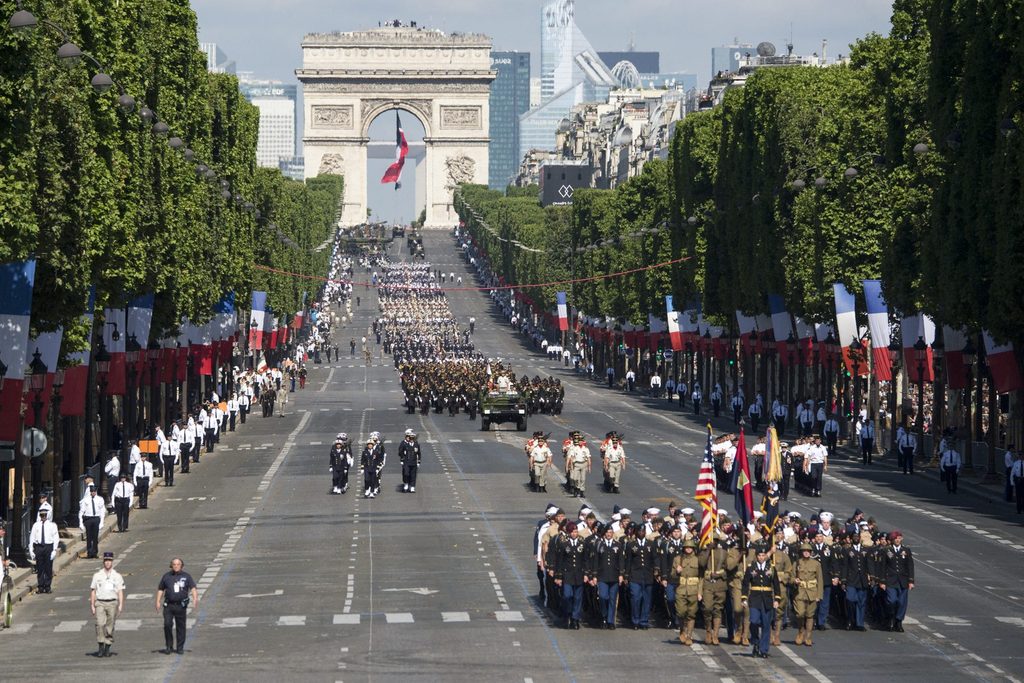With France celebrating its national day on 14 July, festivities will take place under tight surveillance as the government seeks to maintain a firm grip on public order.
General discontent with the State remains high following the riots that rocked the country after a police officer killed a teenager of North African descent during a traffic stop on 27 June. This latest show of civic unrest was preceded by protests against pension reform.
French authorities will deploy heavy-handed security forces for the 14 July festivities, with police across the country told to stop protests related to the police killing of young Nahel.
Thousands of police officers, elite police units and armoured vehicles will be mobilised whilst the sale of fireworks has been heavily restricted.
Republican order
Ahead of the celebration, President Macron said that the "Republican order" ought to be respected. "If there is any disorder, we will intervene with the utmost determination to ensure that all our fellow citizens can live in peace.
The latest series of protests created widescale property damage to commercial spaces, vehicles, and public institutions across France. Authorities responded with massive police deployments, thousands of arrests and hasty trials for people charged with serious vandalism or physical assault.
The case of Nahel has reignited long-standing frustrations in France's disenfranchised suburbs, home to large migrant populations who face higher levels of poverty, youth unemployment or and often harsh police treatement.
#StopMortiers🧨❌| Tout est mis en œuvre pour saisir les mortiers d'artifice, dont la vente a été interdite.
Entre hier et aujourd'hui : 📍 #Clamart : 1 interpellation 👉 2⃣0⃣3⃣ mortiers + 1760 € 📍 #Paris13 : 1 interpellation 👉 8⃣3⃣ engins pyrotechniques + batterie de fusées pic.twitter.com/tW0V4fdhj3 — Préfecture de Police (@prefpolice) July 11, 2023
Tweet translation: Everything is being done to seize fireworks mortars, the sale of which has been banned. Between yesterday and today: Clamart: 1 mortar arrest + €1,760; Paris 13th arrondissement: 1 pyrotechnic device arrest + rocket battery.
For many in France's suburbs, the national day comes with little to celebrate. "In our suburbs, 14 July is at best national folklore," Philippe Rio, the mayor of the town Grigny told L'Humanité.
"The Republican promise hasn't been kept for a long time now; it's more like a fairytale. It is supposed to be embodied in the trinity of liberty-equality-fraternity but the people of Grigny are very conscious of inequality, discrimination and injustice. That's what the Republic means to them."
In Paris, the normal grandiose military parade will take place on the Champs-Elysee avenue. However a march against racism has already been announced, which will move from the east of the city towards Place de Bastille.
Authorities have banned another high-profile protest against police brutality and racism that was set to take place on Saturday 15 July in Paris. The French Interior Ministry has asked police chiefs to ban all protests "related to the riots" sparked by the killing of Nahel, Le Figaro reported.
Exceptional force
On Sunday, the government decreed that the sale of fireworks to individuals would be banned over the entire French territory from 13-15 July. Controls on the Belgian border were also reinforced, RTBF reported.
French Interior Minister Gérald Darmanin has announced that an "exceptional force" of 45,000 police officers and gendarmes will be deployed each night of the weekend. 130,000 police officers will be spread over the country, some 10,000 of them in the Paris area.
For the first time, elite units of anti-riot and anti-terror police will be on guard in "sensitive" communes, Darmanin announced. Helicopters and armoured police vehicles will also be ready to contain any incidents.
Related News
- France: Saturday march in memory of Adama Traoré prohibited
- 'Fund of shame' for Nahel's policeman killer shut down by creator
- Death of Nahel: Brussels police accused of racial profiling in 'preventive' arrests
The 14th of July was also meant to be the day that President Macron addresses the nation after the "100 days of appeasement" that he declared in the aftermath of the pension reform protests in April.
The President had given himself a deadline to come up with a plan to act in the service of the country and respond to people's anchor. He will not make the speech on Friday but in the "coming days", his office announced.

